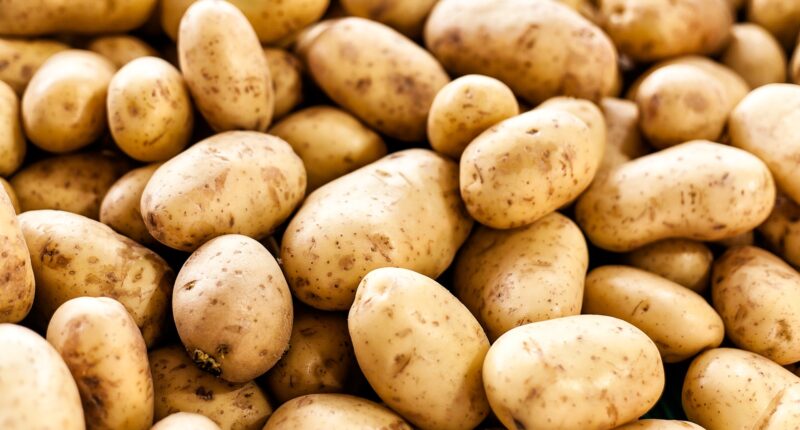In the United States, potatoes are a very popular food, and there are numerous ways to enjoy them. However, you may be wondering whether they are healthy.
Potatoes get a bad rap for being starch bombs, but they’re actually very healthy. Here’s a primer on the health benefits of potatoes, as well as the best ways to prepare the vegetable to maximize its nutritional value.
Rich in Nutrients
One medium-sized baked russet potato with skin has 129 calories, 4.6 grams of protein, no fat, 37 grams of carbohydrate, and about 4 grams of fiber, according to the Department of Agriculture. The veggie is also loaded with nutrients, including 14.4 milligrams of vitamin C. The recommended daily vitamin C intake is 75 to 90 milligrams, according to the Harvard T.H. Chan School of Public Health.
According to an article published in 2021 in the journal Nutrients, other nutrients of potatoes include vitamin B1, which benefits human growth and development; folate, which helps with the production of red blood cells; and vitamin B6 which benefits a lot of diseases, including anemia.
Potatoes are also rich in antioxidants. Antioxidants are a substance known to prevent cell damage which may, in turn, prevent certain diseases, according to the National Library of Medicine.
Supports Exercise Performance
The carbohydrates and nutrients that potatoes provide make them an excellent source of fuel prior to or during exercise.
A 2019 study published in the Journal of Applied Physiology looked at the impact of potato purée versus a commercial carbohydrate gel during prolonged cycling. Researchers found that both foods resulted in equal performance outcomes. Also, the potato purée and the carbohydrate gel resulted in stable blood glucose levels, easier digestion, and better performance during the workout.
If you’re looking for a whole food option to power your workout, consider nibbling on a handful of fingerling potatoes or a small to medium-sized baked potato before your sweat session.
May Help With Weight Management
In addition to their fiber, potatoes also supply resistant starch, according to a review from 2020 in the Journal of the Academy of Nutrition and Dietetics. Resistant starch is a unique kind of carbohydrate your body cannot digest.
In addition to fat-burning resistant starch, potatoes may offer another benefit to managing weight. A study from 2018 in Nutrients states that potatoes tend to be more satiating than other starchy carbs, such as pasta and rice. That means you feel full when consuming potatoes, which can help with weight management.
Doesn’t Negatively Impact Blood Sugar
A 2020 article published in the journal Clinical Nutrition monitored the blood sugar levels of those with type 2 diabetes.
Researchers compared a dinner with rice versus potatoes and monitored the blood sugar levels of the participants to see if there were any differences. Each meal contained 50% carbohydrates, 30% fat, and 20% protein. Researchers collected blood samples from the volunteers before, immediately after, and then every 30 minutes for a couple of hours. The participants also wore a continuous glucose monitor to assess their glucose levels during sleep.
The study found no significant differences between the potatoes and rice or potato preparation. Additionally, the study found that potatoes do not disrupt blood glucose regulation. Therefore, researchers concluded that potatoes are suitable for people with diabetes when consumed as part of a balanced meal.
Best Way To Cook Potatoes
It probably goes without saying that frying anything, including potatoes, isn’t the most nutritious cooking method. But beyond that, you may be wondering if, nutrition-wise, it’s best to boil or bake your taters.
A 2020 study in Plant Foods for Human Nutrition looked at the impact of cooking methods on the contents of potato starch, vitamin C, minerals, and antioxidants. Researchers generally found higher retention of nutrients in potatoes cooked with “dry” methods, such as microwaving or grilling, compared with “wet” methods, including boiling or steaming.
Also, when potatoes are boiled, leaving the skin on preserves more nutrients, preventing minerals from leaching into the water. The study also confirmed that cooling potatoes after cooking increases the resistant starch content.
A Quick Review
In short, potatoes are a nutrient-rich source of energizing, satiating whole-food carbs with potential health and performance benefits. Enjoy them, and feel good about it.
READ NEXT: Authentic Health Benefits Of Blueberries









